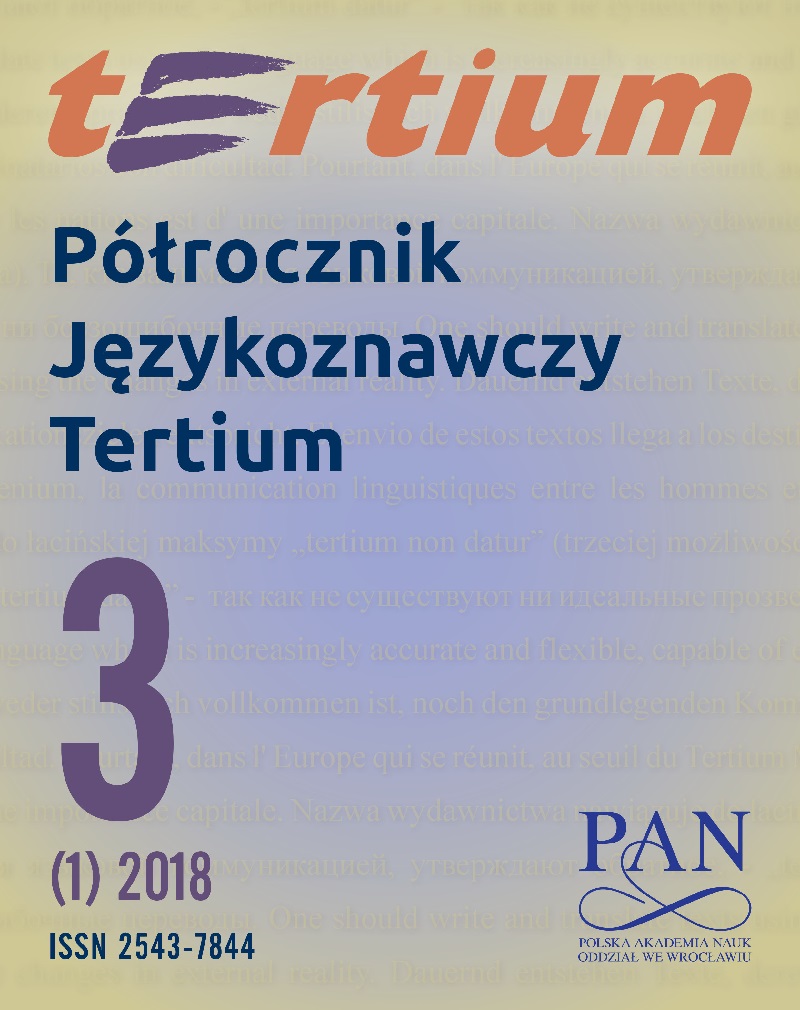Projekt dwujęzycznego słownika językowego savoir-vivre'u
A Project of a Bilingual Dictionary of Linguistic Savoir-Faire
Author(s): Małgorzata MarcjanikSubject(s): Social Sciences, Language and Literature Studies, Applied Linguistics, Communication studies, Sociolinguistics, Descriptive linguistics, Cultural Anthropology / Ethnology, Theory of Communication, Translation Studies
Published by: Krakowskie Towarzystwo Popularyzowania Wiedzy o Komunikacji Językowej Tertium
Keywords: language savoir-vivre; dictionary; Polish language; German language; cultural pragmatics
Summary/Abstract: Przedmiotem artykułu jest omówienie powstającego w ramach projektu badawczego polsko-niemieckiego słownika językowego savoir-vivre’u. Przedstawione zostały założenia leksykograficzne tego słownika, źródło materiału oraz struktura hasła. Główny problem badawczy to niemiecka ekwiwalencja funkcjonalna polskich zwrotów grzecznościowych. Metodologia badań oparta jest na założeniach pragmatyki kulturowej. Autorka skupiła się na omówieniu podstawowych różnic przede wszystkim kulturowych i pragmatycznojęzykowych między polską i niemiecką grzecznością językową. Omówione zostały takie problemy, jak: różne w polszczyźnie i w niemczyźnie strategie grzecznościowe, w tym polska strategia podwładnego i strategia męskiej kurtuazji; polski i niemiecki system adresatywny; możliwość stopniowania uprzejmości w polskich aktach prośby i częstowania oraz problem niemieckiej ekwiwalencji; wpływ czynników społeczno-politycznych na funkcjonowanie form adresatywnych. Wskazano na taki dodatkowy rezultat powstania słownika, jak możliwość zrekonstruowania na jego podstawie obrazu uprzejmego Polaka i uprzejmego Niemca. Na zakończenie została sformułowana teza, że powstawanie tego typu dwujęzycznych (dwukulturowych) słowników miałoby wpływ na zoptymalizowanie komunikacji międzykulturowej. // This paper discusses a Polish-German savoir-faire dictionary, which is currently being created as part of a research project. The author presents the lexicographic framework, the source material and the structure of the entries. The main analytical problem is the German functional equivalence of Polish politeness expressions. The methodology is based on the assumptions of cultural pragmatics. The author focuses on the basic, mainly cultural and pragmalinguistic differences between Polish and German linguistic politeness. The paper discusses the following issues: the differences in Polish and German politeness strategies, including the Polish strategy of the subordinate and the strategy of male courtesy; Polish and German honorific systems; the possibility of grading politeness in the Polish speech acts of request and the offering of food as well as the problem of German equivalence; the influence of socio-political factors on the functioning of the honorific forms. The author points out that the creation of this dictionary opens up the possibility of reconstructing the notions of a polite Pole and a polite German. Finally, the author formulates the thesis that the creation of this type of bilingual (bicultural) dictionaries may result in the optimisation of intercultural communication.
Journal: Półrocznik Językoznawczy Tertium
- Issue Year: 3/2018
- Issue No: 1
- Page Range: 113-126
- Page Count: 14
- Language: Polish

